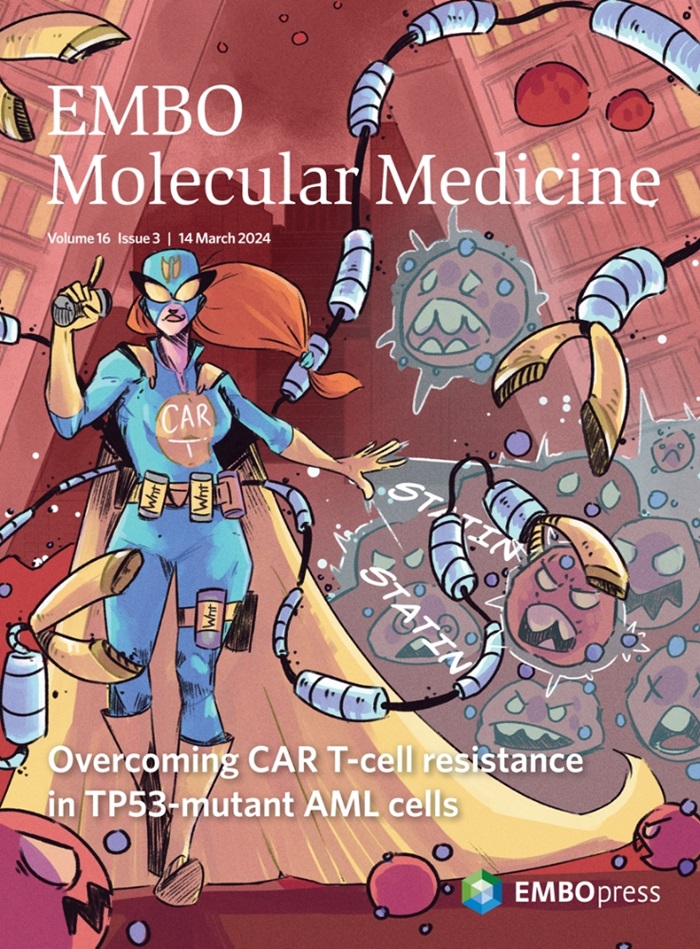CRISPR-enabled point-of-care genotyping for APOL1 genetic risk assessment.
IF 9
1区 医学
Q1 MEDICINE, RESEARCH & EXPERIMENTAL
引用次数: 0
Abstract
Detecting genetic variants enables risk factor identification, disease screening, and initiation of preventative therapeutics. However, current methods, relying on hybridization or sequencing, are unsuitable for point-of-care settings. In contrast, CRISPR-based-diagnostics offer high sensitivity and specificity for point-of-care applications. While these methods have predominantly been used for pathogen sensing, their utilization for genotyping is limited. Here, we report a multiplexed CRISPR-based genotyping assay using LwaCas13a, PsmCas13b, and LbaCas12a, enabling the simultaneous detection of six genotypes. We applied this assay to identify genetic variants in the APOL1 gene prevalent among African Americans, which are associated with an 8-30-fold increase in the risk of developing kidney disease. Machine learning facilitated robust analysis across a multicenter clinical cohort of more than 100 patients, accurately identifying their genotypes. In addition, we optimized the readout using a multi-analyte lateral-flow assay demonstrating the ability for simplified genotype determination of clinical samples. Our CRISPR-based genotyping assay enables cost-effective point-of-care genetic variant detection due to its simplicity, versatility, and fast readout.用于 APOL1 遗传风险评估的 CRISPR 支持的护理点基因分型。
检测基因变异有助于识别风险因素、筛查疾病和启动预防性疗法。然而,目前依赖杂交或测序的方法并不适合在护理点环境中使用。相比之下,基于 CRISPR 的诊断方法具有高灵敏度和高特异性,可用于护理点应用。虽然这些方法主要用于病原体检测,但在基因分型方面的应用却很有限。在此,我们报告了一种基于 CRISPR 的多重基因分型检测方法,该方法使用 LwaCas13a、PsmCas13b 和 LbaCas12a,可同时检测六种基因型。我们应用这种检测方法鉴定了非裔美国人中普遍存在的 APOL1 基因中的遗传变异,这些变异与肾病患病风险增加 8-30 倍有关。机器学习有助于对 100 多名患者的多中心临床队列进行稳健分析,准确确定他们的基因型。此外,我们还利用多分析横向流动测定法优化了读出结果,证明了简化临床样本基因型测定的能力。我们基于CRISPR的基因分型测定因其简便性、多功能性和快速读出,实现了具有成本效益的床旁基因变异检测。
本文章由计算机程序翻译,如有差异,请以英文原文为准。
求助全文
约1分钟内获得全文
求助全文
来源期刊

EMBO Molecular Medicine
医学-医学:研究与实验
CiteScore
17.70
自引率
0.90%
发文量
105
审稿时长
4-8 weeks
期刊介绍:
EMBO Molecular Medicine is an open access journal in the field of experimental medicine, dedicated to science at the interface between clinical research and basic life sciences. In addition to human data, we welcome original studies performed in cells and/or animals provided they demonstrate human disease relevance.
To enhance and better specify our commitment to precision medicine, we have expanded the scope of EMM and call for contributions in the following fields:
Environmental health and medicine, in particular studies in the field of environmental medicine in its functional and mechanistic aspects (exposome studies, toxicology, biomarkers, modeling, and intervention).
Clinical studies and case reports - Human clinical studies providing decisive clues how to control a given disease (epidemiological, pathophysiological, therapeutic, and vaccine studies). Case reports supporting hypothesis-driven research on the disease.
Biomedical technologies - Studies that present innovative materials, tools, devices, and technologies with direct translational potential and applicability (imaging technologies, drug delivery systems, tissue engineering, and AI)
 求助内容:
求助内容: 应助结果提醒方式:
应助结果提醒方式:


